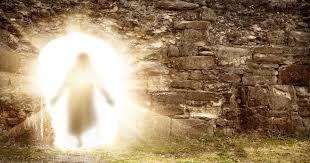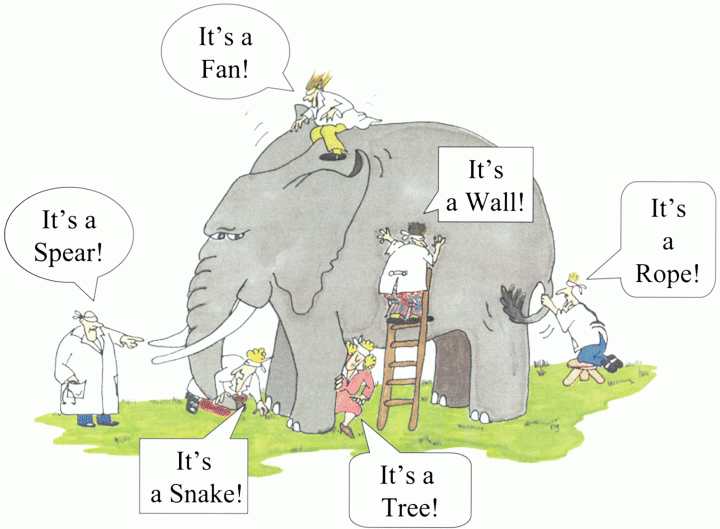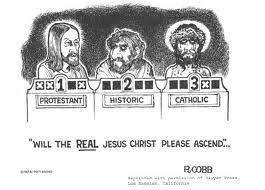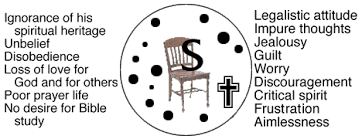
Some Notes about...

It is possible for a person to hold to sound doctrine, and to New Testament orthodoxy, and to conform to family "values," and to community "norms"— and yet not know Jesus personally very well, if at all! Probably 80% of those good folks who sit in church and put their tithe weekly into the offering plate, have no viable intimate, ongoing relationship with Jesus Christ, the King of all kings and Lord of all lords. Trouble is, the real God is a living Being, very personal and very whole (holy). We are the broken ones, the damaged-goods, the works-in-progess!
Ask someone today what he or she believes and most moderns hold to existential faith with little content. Church creedal statements are now irrelevant for many. We almost expect church goers to be hypocrites. Even many who attend a Seeker Church never Find!
For though there be that are called gods, whether in heaven or in earth, (as there be gods many, and lords many,) but to us there is but one God, the Father, of whom are all things, and we in him; and one Lord Jesus Christ, by whom are all things, and we by him." (1 Corinthians 8:5,6)
I was taught in the Baptist Church (where I was "S-A-V-E-D" in 1962) that history was divided into great blocks of time called "dispensations." We were living, I was told, in "the Dispensation of the Church"-- the Old Testament and the Four Gospels were not about us nor for us. I ought to read them as supplementary knowledge, but it was the Epistles which carried the most weight. This whole world view was very misleading, I now see. (This article, The Management of the Universe describes my current understanding.)
| Christianity today is man-centered, not God-centered. God is made to wait patiently, even respectfully, on the whims of men. The image of God currently popular is that of a distracted Father, struggling in heartbroken desperation to get people to accept a Savior of whom they feel no need and in whom they have very little interest. To persuade these self-sufficient souls to respond to His generous offers God will do almost anything, even using salesmanship methods and talking down to them in the chummiest way imaginable. This view of things is, of course, a kind of religious romanticism which, while it often uses flattering and sometimes embarrassing terms in praise of God, manages nevertheless to make man the star of the show. --A. W. Tozer, Man: The Dwelling Place of God. |

| "The teaching of the New Testament is that now, at this very moment, there is a Man in heaven appearing in the presence of God for us. He is as certainly a man as was Adam or Moses or Paul; he is a man glorified, but his glorification did not de-humanize him. Today he is a real man, of the race of mankind, bearing our lineaments and dimensions, a visible and audible man, whom any other man would recognize instantly as one of us. "But more than this, he is the heir of all things, Lord of all lords, head of the church, firstborn of the new creation. He is the way to God, the life of the believer, the hope of Israel, and the high priest of every true worshiper. He holds the keys of death and hell, and stands as advocate and surety for everyone who believes on him in truth. Salvation comes not by accepting the finished work, or deciding for Christ; it comes by believing on the Lord Jesus Christ, the whole, living, victorious Lord who, as God and man, fought our fight and won it, accepted our debt as his own and paid it, took our sins and died under them, and rose again to set us free. This is the true Christ; nothing less will do." (A.W. Tozer) |

The Onion and the Lake of Fire(Related by Ray C. Stedman). |
 A note to me this week from my friend Bryce Self concerned his study of the four gospels. "A profound realization swum to the surface for me a few years ago as I was teaching verse-by-verse through the Gospels (all four, combined) with my Sunday class — which took 150 sessions and three years.
A note to me this week from my friend Bryce Self concerned his study of the four gospels. "A profound realization swum to the surface for me a few years ago as I was teaching verse-by-verse through the Gospels (all four, combined) with my Sunday class — which took 150 sessions and three years.
Many passages and incidents in Christ’s public ministry took on new depth or aspects of meaning in the process of exposition rather than just reading and studying for myself. As the series neared its finish with the events of Passion Week, I realized that my understanding of what motivated Jesus had shifted.
All our Christian lives we have been told and taught that Jesus loves us so much that He died for us and our sins. But that is a rather simplistic reduction from a full-orbed view of the Lord’s work from His own viewpoint expressed in His own words. In several instances He actually made direct statements about why He had come and what He was about.
The primary factor for Jesus Himself was always to do the will of the Father. At the close of His ministry He could say with satisfaction that He had accomplished all He was sent to do. The great joy and reward that was set before Him, for which He endured the Cross, despising the shame, was His triumphant vindication by the Father, and the victorious and glorious reunion that followed. In a sense, our salvation and the destruction of the works of the enemy, even the eventual renovation of the entire cosmos, are by-products of the absolute commitment of Jesus Christ to perform the will of the Father in loving obedience and trust. All the rest was entailed in this, but this was the primary thing to Him.
It is very true that what faithfulness we do acquire depends entirely upon that possessed by Jesus and is provided from Him. We certainly have none of our own!!! Yet we are still called to demonstrate practical faithfulness as well as to lay hold of and contend for the The Faith delivered to us. Both aspects of “faith” and “faithfulness” are intended with the Greek word “pistis”. The English equivalent (as often the case) is rather too narrow in our common usage.
But among ourselves, with agreed and established foundations, we should be able to use this kind of theological shorthand that does not feel the need to make all the nuances explicit each instance something is mentioned. It’s usually apparent when a point has been missed and it’s time to spell things out more fully.
Centuries beforehand Isaiah was already clear on this — that it would be primarily a transaction between the Almighty and His Servant, for which the salvation of sinners was (in part) to be the reward of the Father given to the Son for His obedience. This utterly demolishes the foundational sense of egotistical self-worth that permeated most American-style Christianity — that I was so valuable that Jesus paid the ultimate price for me. When the actual fact is that we are utterly worthless, lost, and consigned to condemnation. it is our very worthlessness that results in such glory to Jesus in reward -- in our being chosen by the Father, redeemed by the Son, and sanctified through the Holy Spirit — that such an end could be worked in such material will be an everlasting “praise to the glory of His grace.” Not to us, but to Your Name, give glory!
Yet it pleased the LORD to bruise Him; He has put Him to grief. When You make His soul an offering for sin, He shall see His seed, He shall prolong His days, And the pleasure of the LORD shall prosper in His hand. He shall see the labor of His soul, and be satisfied. By His knowledge My righteous Servant shall justify many, For He shall bear their iniquities. Therefore I will divide Him a portion with the great, And He shall divide the spoil with the strong, Because He poured out His soul unto death, And He was numbered with the transgressors, And He bore the sin of many, And made intercession for the transgressors." (Isaiah 53:10-12 NKJV)
"Indeed He says, ‘It is too small a thing that You should be My Servant To raise up the tribes of Jacob, And to restore the preserved ones of Israel; I will also give You as a light to the Gentiles, That You should be My salvation to the ends of the earth.’ ” Thus says the LORD, The Redeemer of Israel, their Holy One, To Him whom man despises, To Him whom the nation abhors, To the Servant of rulers: Kings shall see and arise, Princes also shall worship, Because of the LORD who is faithful, The Holy One of Israel; And He has chosen You.” (Isaiah 49:6-7 NKJV)
"For it was fitting for Him, for whom are all things and by whom are all things, in bringing many sons to glory, to make the captain of their salvation perfect through sufferings. For both He who sanctifies and those who are being sanctified are all of one, for which reason He is not ashamed to call them brethren, saying: 'I will declare Your name to My brethren; in the midst of the assembly I will sing praise to You.' "And again: 'I will put My trust in Him.' "And again: 'Here am I and the children whom God has given Me.’" (Hebrews 2:10-13 NKJV)
My Pastoral Class notes introducing the Pastoral Epistles give some of the context for Paul’s marked emphasis on sound doctrine (or teaching, = Greek, 'didache’). On the other hand, Paul himself is also aware of the danger (and prophesied predominance) of those who “hold a form of godliness" but deny its power. And like Paul, the other apostolic writers Peter, James, and Jude are also all concerned to pass along ”The Faith” in all its purity along to a new generation as they prepare to exit the scenes of their earthly labors.
This “Faith” (Greek = ‘pistis’) is not solely the correct doctrinal content, as critical and required as that certainly is. It is a living faith in and faithful relationship with the Savior who has been revealed in terms of Biblical doctrine, and whose authenticity we know we can trust because (in part) of His very conformity to and fulfillment of the doctrinal content of God’s unalterable revelation in Scripture.
|
It’s not a case of either/or, I think, but rather “This also you ought to have done, and not left the other undone.”


I can't help but be convinced that most of the real Christians in the world (they must know Jesus personally) are not church "members." Many never darken the door of a church "building."
I tried to categorize them last year as follows:

Jesus is a Single Man
Jesus Made Simple
A Weekend in Jerusalem with Jesus
The One New Paradigm
The Eightfold Way to Knowing God
Jesus' Death: Six Hours of Eternity on the Cross
The Great Generational Disconnect
Your God is Way Too Small
How Saved are You?

If God were proud He would hardly have us on such terms:
but He is not proud,
He stoops to conquer,
He will have us even though we have shown that we prefer everything else to Him,
and come to Him because there is 'nothing better' now to be had.” (CSL).

Contributions\
![]() Email Lambert:
Email Lambert:
Lambert’s recent stuff (since 2018): Help thyself.
Newsletter Index
Original Home Page (1995)
November 20, 2023. April 28, 2021. November 21, 2023.